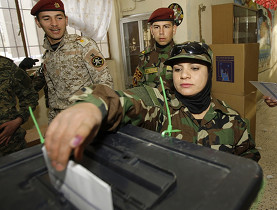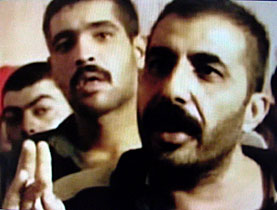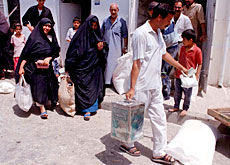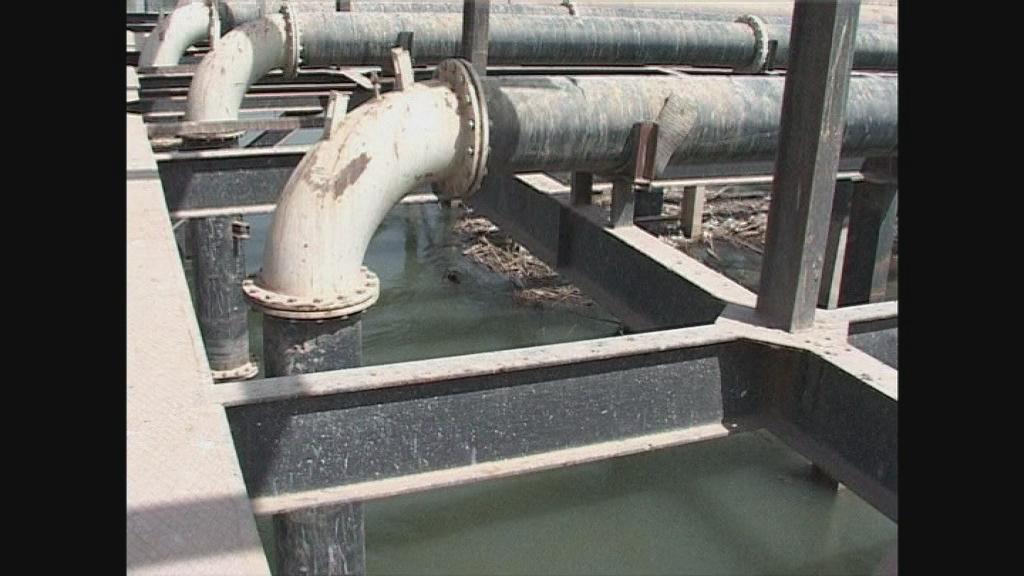Iraq faces test-case provincial election

Saturday's provincial election in Iraq, which may redraw the country's political map, is a crucial test of Iraq's tenuous stability, say Swiss experts.
The election – the first since 2005 – will measure the popularity of Iraq’s main coalitions and set the tone for parliamentary elections in late 2009 as US forces stand poised to withdraw from the country.
Holding the ballot is seen as an important sign that Iraq has emerged from the worst of the violence that engulfed it after the invasion in 2003 and worsened after the last election in 2005.
“The big hope is that these elections will contribute to settling political differences by democratic means instead of violence as was unfortunately the case after the elections in 2005,” Swiss ambassador to Iraq, Martin Aeschbacher, told swissinfo.
“They should allow political imbalances to be corrected which resulted from the provincial and national elections in 2005, which were partially boycotted by important segments of the population, mainly Sunni Arabs and followers of Moqtada al-Sadr.”
There is no shortage of enthusiasm for democracy almost six years after the US-led invasion to oust Saddam Hussein. Some 14,400 candidates, including nearly 4,000 women, are competing for 444 seats on ruling councils in 14 of the country’s 18 provinces.
The central authorities in Baghdad still control the nation’s overall policies, but the councils have wide powers such as cutting commercial deals and setting spending priorities.
Iraq is starting to see the light at the end of the tunnel, said Hasni Abidi, the director of the Study and Research Centre for the Arab and Mediterranean World in Geneva.
“There is a return to political normality among the candidates and voters,” he said. “It’s the first time since the fall of Saddam Hussein that Iraqis will be able to vote for candidates whose faces are not hidden.”
“The US occupation is no longer an issue; voters are interested in everyday concerns – unemployment, healthcare, etc.”
Redraw the landscape
The provincial poll will set the political climate for a national election due later this year, in which Prime Minister Nuri al-Maliki will fight to keep his mandate.
Al-Maliki, who claims credit countrywide for better security but has little clout in the provinces, is aiming to win a share of regional power from larger rival Shi’ite parties.
Elsewhere, Sunni Arabs who boycotted the last provincial polls are seeking a bigger share of local power.
Maliki’s Shi’ite rivals, the Supreme Islamic Iraqi Council, control nearly all southern provinces and could tighten their grip. Another potent Shi’ite group, followers of anti-American cleric Moqtada al-Sadr, is on the back foot after Maliki’s troops and US air power defeated their militia last year.
In the volatile north, US officials hope the vote can ease violence by bringing once-hostile Sunni Arabs into politics.
“Overall, we will see a confirmation of the traditional parties and new alliances, especially with the Sunnis,” said Abidi.
Test of stability
The provincial election is an important test of Iraq’s stability. Serious violence would cast doubt over Iraq’s future and could influence US President Barack Obama’s decision on how fast to remove the 142,000 American troops.
In his presidential campaign Obama pledged to withdraw troops by May 2010. But any serious attacks could raise worries in Washington about the timetable and the capabilities of Iraqi forces to handle major security operations on their own.
Despite daily attacks, the election campaign so far has not seen the surge in violence feared by US and Iraqi commanders.
“Security has improved considerably,” said Abidi. “The US and Iraqi authorities have changed their strategy and it has paid off. There will be tensions and pockets of violence, but the election is taking place in a different atmosphere.”
Remaining challenges
Many Iraqis talk of change, and hope the election will reform regional governments that spend billions of dollars of state funds but are widely seen as corrupt, unaccountable and beholden to the interests of feuding sectarian groups.
The most recent US Pentagon report to Congress, issued in December, summarized the growing frustrations of many Iraqis and the sketchy progress by US and Iraqi reconstruction teams: shortages of clean water, electricity cuts, overtaxed sewage systems.
“The lack of essential services has now replaced security as the most important concern in the minds of most Iraqis,” the report said.
The list of remaining challenges is long, said the Swiss ambassador.
“This includes reviewing the constitution, enacting a hydrocarbons law, reaching compromises over the so called ‘disputed’ territories – in particular Kirkuk – disbanding militias and creating truly non-sectarian security forces, fighting corruption and bureaucracy, defining the degree of decentralisation, federalism… without forgetting the huge social and economic problems,” said Aeschbacher.
It may be at least a month before the poll outcome is clear. Preliminary counts will not be available for days and the final tally for weeks. Then it could take weeks more for councils to meet, form coalitions and pick new governors.
swissinfo, Simon Bradley
US military officials say violence in Iraq is at a four-year low. Despite the drop, car bombs and attacks are continuing daily in Iraq.
The status-of-forces agreement between the United States and Iraq came into effect on January 1, 2009. It calls for US combat troops to be out of Iraqi cities and towns by the end of June and out of Iraq by the end of 2011.
US President Barack Obama pledged during his campaign to remove all combat troops from Iraq by May 2010. But he has said he would consult with military commanders first and adjust his timeline if sticking to it would risk the safety of US troops remaining behind to train Iraqis and fight al-Qaida or cause backsliding in Iraqi stability.
Under an agreement with Iraq, British combat troops stationed in Basra province will withdraw by July 31, six years after joining the US invasion to topple Saddam Hussein. They have already pulled back from the city to the nearby airport.
If the security situation in Iraq continues to improve, the number of refugees and displaced people returning to their homes could more than double this year to 500,000, the UN refugee agency said Thursday.
Iraqis go to the polls on Saturday for the first time in more than three years in milestone local elections that could redraw the country’s political map.
Iraqis in 14 out of Iraq’s 18 provinces will vote to select members of provincial councils, whose duties include choosing provincial governors and provincial administrations.
There are 440 provincial council seats at stake. 14,431 candidates are registered, including 3,912 women. They belong to more than 400 parties or groups.
The provincial elections will take place later in the three Kurdish-ruled provinces. In another province, oil-rich Kirkuk, the vote was postponed indefinitely because its various ethnic groups could not agree on a power-sharing formula.

In compliance with the JTI standards
More: SWI swissinfo.ch certified by the Journalism Trust Initiative





You can find an overview of ongoing debates with our journalists here. Please join us!
If you want to start a conversation about a topic raised in this article or want to report factual errors, email us at english@swissinfo.ch.